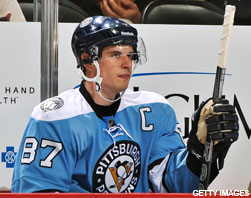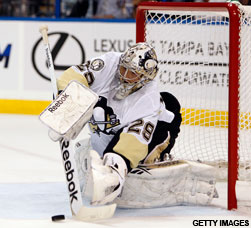The NHL drops the puck on the ’11-12 season facing a host of off-the-ice issues. Concussions -- a hot topic this offseason -- will be a dominant theme with the league’s biggest star, Sidney Crosby, still sidelined due to the lingering effects of two jarring hits last season. Meanwhile, three franchises -- the Coyotes, Blues and Stars -- begin the new campaign with ownership uncertainty. And with the league’s CBA expiring at the end of the season, labor will become a much-talked about issue in the coming months. However, it is not all doom and gloom. The NHL has steadily grown its revenues since the ’04-05 lockout, and the 10-year, $2B TV rights deal signed this offseason with NBC/Versus promises to continue to raise the league’s profile. THE DAILY caught up with Yahoo Sports' Greg Wyshynski, the Pittsburgh Post-Gazette's Shelly Anderson and the Montreal Gazette's Pat Hickey to discuss some of this season's hot-button issues.
 |
Crosby will start season on IR as he continues
to recover from concussion suffered last season |
Q: What is the biggest off-ice challenge facing the league this season? Wyshynski: The politics of player safety. The biggest story in hockey leading into the season, perhaps even more than the status of Sidney Crosby’s grey matter, is the new Executive VP of Player Safety Brendan Shanahan’s approach to the gig: transparency, clarity and emphatic suspensions. The NHL-created infomercials that he hosts for every case of supplemental discipline are a game-changer for professional sports in the way they communicate with players, fans and media. But what happens when it’s not a repeat offender or a player who plays four minutes per game that’s being targeted for a suspension? That’s where hypocrisy and politics could factor in. Beyond the task in Shanahan’s hands, there are also serious debates about how far-reaching player safety initiatives should become.
Anderson: The overall issue of safety, in particular head injuries, and the perception of what the NHL is doing about it.
Hickey: Resolving the ownership/arena issues in Phoenix, St. Louis, Dallas and Long Island. St. Louis and Dallas appear to be coming along, but others are highly problematic.
Q: Finish this sentence: Over the last few years, the business of the NHL has...
Wyshynski: … been better than anyone could have anticipated after the lockout, but not as good as the NHL touts it to be. There’s no denying that the NHL is printing money on merchandise -- thanks in part to the Winter Classic -- and at the gate in most cities, with the price of tickets growing forever higher. The sponsorships have increased and grown more prestigious; no more Waste Management sponsoring the between-periods show on Versus. And speaking of Versus: 10 years and $2 billion is not a bad television contract in 2011 for hockey. But problems remain. Salaries have escalated as revenue has grown, and the salary cap floor is forcing some teams to spend irresponsibly to reach it.
Anderson: … grown and gotten more corporate, but let's see what the new CBA brings.
Hickey: … been expanding but the overall rise in revenues overshadows the problems in the have-not cities which have trouble coping with the rising salary cap floor.
Q: Which ownership situation will be resolved first: Phoenix, St. Louis or Dallas?
Wyshynski: Dallas appears to be on the fast track. St. Louis seems to be holding out for a higher offer, and Phoenix has had more false starts than the 50-meter dash at the Caffeine Olympics.
Anderson: Looks like Dallas.
Hickey: Dallas.
Q: Which city should be next in line for an NHL team?
Wyshynski: I’m intrigued by Seattle. It’s a natural fit for the Western Conference, a natural rival for Vancouver and a market whose demos would seem to fit with the NHL’s. In Canada, it’s Quebec City, hands down.
Anderson: Hamilton or Quebec City would probably make the most sense in terms of instant fan base, so it will probably be Las Vegas or Kansas City.
Hickey: Quebec City.
Q: Who would you rank as the most effective/least effective owner in the league?
Wyshynski: The most effective is Mike Ilitch with the Detroit Red Wings, who has put some of the smartest hockey men in the NHL on the same staff and the results speak for themselves. The least effective is Charles Wang of the New York Islanders. He can’t attract an elite free agent, he can’t convince the locals to vote for a new arena project and -- rightly or wrongly -- he’ll never live down the [Rick] DiPietro contract.
Anderson: Mario Lemieux in Pittsburgh seems to be getting things done on local and league levels. The least effective would be the lot of owners whose teams are struggling financially.
Hickey: Most: Jeff Vinik. Least: Charles Wang.
Q: How should/can the NHL take advantage of a possible NBA work stoppage?
Wyshynski: Get creative. Offer gear exchanges at games (NBA hat for NHL hat). Offer ticket discounts to NBA fans who bring in gear. Hire former NBA players to cut promos talking about the virtues of professional hockey. Have a little fun at the expense of someone else’s misery.
Anderson: Simply put out the best possible product, fill the void as much as possible and hope that Sidney Crosby comes back soon. If the NBA is still offline past the end of the football season, that's when the NHL should ramp up marketing, advertising, etc., to take full advantage.
Q: What are the odds the NHL and NHLPA reach an agreement on a new CBA before its expiration at the end of the season?
Wyshynski: Slim. Not with so many issues on the table for both sides. I still don’t see this as the system-shattering standoff that produced the lockout. But when shares of revenue and long-term contracts are your starting point, that’s not an agreement forged during a season.
Anderson: Probably not by the end of the 2011-12 season, but before it expires next September. There has to be time for some posturing and old-fashioned haggling.
Hickey: 50-1.
Q: Is fighting good or bad for the league?
Wyshynski: From an on-ice perspective, I think fighting is good for the game. … It’s also entertaining, though many fans have different appetites for it. … The videos we run featuring solid fights get more traffic than ever. Whether they admit it or not, fans watch fights. Is it good or bad for the league? I think a fighting ban would do more harm than good. But from a personal standpoint, an NHL without fighting would be unrecognizable to me.
Anderson: It's moving more and more toward being bad for the NHL. It's hard to imagine there would really be much attrition among established fans if fighting were weeded out of the game in spite of some of their claims, but easy to imagine that the league would have a better time attracting new fans in that scenario.
Hickey: Bad in Canada; good in many U.S. markets.
 |
Writer would like to see NHL put more of
a marketing focus on goalies, defensive players |
Q: Who should the league be marketing more?
Wyshynski: The league has done a hell of a job growing multiple stars beyond the Crosby/Ovechkin duo and growing compelling teams beyond the usual suspects. But my go-to answer here: defensive players and goalies. They’ve never figured out how to make these players as marketable as a linebacker in the NFL or a pitcher in MLB.
Anderson: Alex Ovechkin and other top players not named Sidney Crosby. Crosby is a great ambassador for the NHL, but he's not the only great player.
Q: Who’s the best play-by-play announcer and analyst in hockey?
Wyshynski: The best play-by-play man remains Doc Emrick. He’s a national treasure in the U.S., and one of the few announcers I’ve heard that can perfectly match his tone and tenor with the mounting chaos on the ice. Honorable mention: Jack Edwards of NESN, for his fight calls and obscure Revolutionary War metaphors. The best analyst, with John Davison unfortunately in the St. Louis Blues front office instead of behind a mic, is Daryl “Razor” Reaugh, who does Dallas Stars games and some national work. Informed, opinioned and very clever.
Anderson: Gotta go with Doc Emrick. Lots of good analysts.
Hickey: Play-by-play: Gord Miller (TSN) and Doc Emrick (NBC). Analyst: Pierre McGuire (NBC).
Q: What’s the best arena in the league?
Wyshynski: For atmosphere, it’s Bell Centre in Montreal, where the fans are just deafening and fun. For amenities, The Rock in Newark is the best barn in the league.
Anderson: Bell Centre -- the fans, the hockey knowledge, the video screen.
Hickey: Bell Centre Montreal for media, Consol Energy Center for fans.





